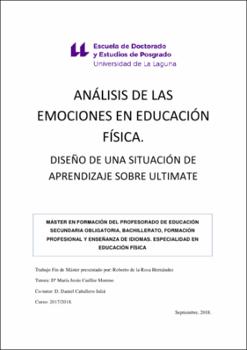Análisis de las emociones en Educación Física
Date
2018Abstract
La finalidad de este trabajo de fin de máster es evaluar el impacto de una situación de aprendizaje relacionada con el deporte del Ultimate sobre las emociones que se generan en el alumnado. También se valorará la intensidad de las emociones en las distintas tareas propuestas de juegos deportivos de distintos dominios de acción motriz, ya sean de aspecto psicomotor, cooperación o cooperación-oposición dentro de esa misma situación de aprendizaje. Un total de 49 alumnos entre 14 y 15 años de 4º de la ESO, distribuidos en dos clases de un colegio concertado de Santa Cruz de Tenerife participaron en este estudio, donde 24 pertenecían al sexo masculino y 25 al sexo femenino. Un mismo profesor impartió 5 sesiones de Ultimate de 50 minutos de duración durante el período comprendido entre el 23 de abril y el 28 de mayo de 2018 a cada uno de los grupos. Con posterioridad a la situación de aprendizaje, y tras el análisis de los cuestionarios Games and Emotion Scale aparecen los resultados, que muestran que, según la situación de aprendizaje desarrollada existe una mayor cantidad de emociones positivas respecto a las negativas y ambiguas. También muestra que existen diferencias significativas entre los diferentes tipos de juegos, donde el alumnado se decanta más por aquellos que son de dominio psicomotriz y, por último, existe una diferencia significativa en las emociones negativas que suscitan los juegos psicomotores en las mujeres. En cambio, no se aprecian diferencias significativas en el resto de los dominios de acción motriz. The purpose of this master´s thesis is to evaluate the impact of a learning situation related to the Ultimate sport on the emotions that are generated in the students. The intensity of emotions will also be assessed in the different proposed tasks of sport games of different motor action domains, whether they are psychomotor, cooperation or cooperation-opposition aspects within that same learning situation. A total of 49 students between 14 and 15 years of 4th of ESO, distributed in two classes of a school of Santa Cruz de Tenerife participated in this study, where 24 belonged to the male sex and 25 to the female sex. The same teacher gave 5 sessions of Ultimate of 50 minutes duration during the period between April 23 and May 28, 2018 to each of the groups. After the learning situation, and after the analysis of the Games and Emotion Scale questionnaires, the results appear, which show that, according to the learning situation developed, there is a greater number of positive emotions than negative and ambiguous ones. It also shows that there are significant differences between the different types of games, where the students opt for more those who are psychomotor domain and, finally, there is a significant difference in the negative emotions that provoke psychomotor games in women. On the other hand, no significant differences were observed in the rest of the motor action domains.




